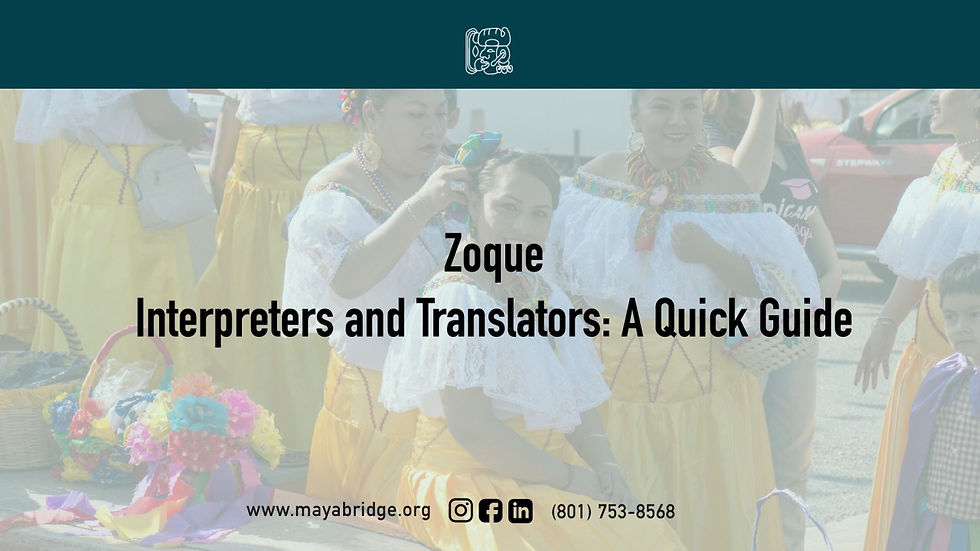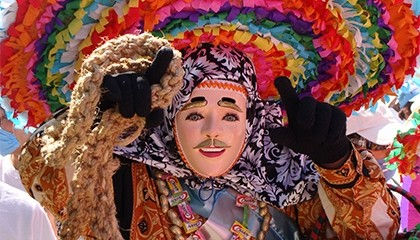Zoque Interpreters and Translators: A Quick Guide
- Jace Norton
- Jul 4, 2025
- 4 min read
Updated: Dec 10, 2025

As the Zoque people increasingly migrate to the United States for safety, economic opportunities, and a better quality of life, language access is one of their biggest obstacles. This is where Zoque interpreters and translators step in and help migrants integrate safely into their new surroundings.
For the Zoque, whose cultural and linguistic heritage has stood the test of time, language services play a major role in bridging the gap between their traditional ways of life and the challenges of modern migration.
This blog explores the Zoque language, why the Zoque are migrating, and the help interpreters can provide as they settle in the United States.
Who speaks Zoque?
Zoque is a group of languages spoken by the Zoque people, an Indigenous community concentrated in the southern Mexican states of Chiapas, Oaxaca, Tabasco, and parts of Veracruz. It is estimated that there are roughly only about 100,000 speakers left, as many Zoque have begun to speak Spanish instead.
Zoque belongs to the Mixe-Zoquean language family and also shares roots with the Mixe languages. Linguists classify it into three groups: Gulf Zoquean, Oaxacan Zoque, and Chiapas Zoque. Each has its own variants, many of which are now considered critically endangered.
Archaeological records place the Zoque people on the Pacific coast of Chiapas over 5,800 years ago. They were among the first cultures in Mesoamerica to shift from foraging to maize cultivation. By the 14th century, the Zapotecs had seized parts of Zoque territory and created a geographical division between the Zoque and Mixe peoples. Spanish colonization began in 1523, with it came forced labor, tribute demands, and a catastrophic population decline.
In the centuries that followed, the Zoque fought to retain their ancestral lands, especially in Mexico’s Chimalapas region, as government policies and corporate interests sought to push them out. Despite the ejido system's protection during the 20th century, land reforms brought in a new era of tension on their lands.
Despite increasing assimilation into the broader Mexican culture, agriculture remains central to the Zoque. They cultivate maize, beans, and squash, along with coffee, cocoa, and fruit. Pottery, especially black clay pieces rimmed in white, and traditional dress (mainly worn by women) also remain important cultural symbols.

Why are the Zoque migrating?
The Zoque are migrating for a variety of reasons, primarily economic hardship, destruction of their land, and limited access to opportunity. With fewer means to sustain themselves at home, many have turned to internal or international migration. Some look for work in Mexican cities, while others travel north to the United States, hoping to support the families they leave behind through remittances.
For generations, the Zoque relied on small-scale farming, especially maize, as the backbone of their economy and diet. However, when NAFTA took effect, Mexican markets were flooded with subsidized U.S. corn. In turn, this lowered the value of local harvests, compromised food security, and forced many to abandon agriculture altogether, ultimately driving migration as families looked for alternative income sources.
Deteriorating environmental conditions in traditional Zoque territory, especially in the biodiverse Chimalapas region, have further accelerated migration. Illegal logging, deforestation, and infrastructure projects have stripped the land of its fertility and ecological resilience. As forests disappear and rivers dry up, traditional ways of life have become increasingly unsustainable.

The Roles And Importance Of Zoque Interpreters
Zoque interpreters help migrants to express themselves and understand the information they are given, allowing them to better advocate for themselves and make more informed decisions.
Interpreters act as trusted guides for Zoque migrants, guiding them through the complex U.S. immigration system, and helping them get access to medical, legal, and social services. In settings like doctor's appointments, immigration proceedings, and court hearings, qualified Zoque interpreters are indispensable.
Besides providing language assistance, interpreters are also integral to intercultural communication. Having an interpreter who understands both American and Zoque cultures can help make communication smoother and less stressful for both sides.
Finding a Zoque interpreter is a challenge because of the language’s limited number of fluent speakers and lack of formal training programs. Without institutional support or educational pathways, the pool of interpreters cannot grow.
This language disparity restricts Zoque speakers' access to healthcare, legal aid, and social services. Without language services, they are at risk of misdiagnoses, unfair asylum decisions, and unjust deportations. Zoque speakers need access to qualified interpreters to have a clear understanding of their circumstances and exercise their fundamental right to language access in the U.S.
Work With A Zoque Interpreter from Maya Bridge
We offer language services for Zoque and all of its variants. Our Zoque-to-English interpretation services are trusted by government agencies, healthcare providers, and courts across the country. As a small, niche agency specializing in Indigenous languages, we are uniquely equipped to deliver on-demand Zoque interpretation, 24 hours a day.
We offer:
Video Remote Zoque Interpretation
Over-the-phone Zoque Interpretation
In-person Zoque Interpretation
Court-certified Zoque Interpretation
Medical-certified Zoque Interpretation
Zoque Translation
Zoque Voiceover and Subtitles
Learn more about our language services here.
Maya Bridge - A Leading Advocate For Indigenous and Lower-resource Language Access In The U.S.
At Maya Bridge Language Services, we’re a mission-driven interpretation agency offering 24/7 on-demand services. We proudly provide interpretation in over 230 languages, including more than 145 Indigenous and low-diffusion languages from Latin America, Africa, Asia, the Pacific Islands, and Native American communities.
Since 2021, we have worked diligently to mobilize, train, and evaluate a network of hundreds of interpreters both in the U.S. and throughout the world. Our growing network of trained interpreters ensures that Indigenous language speakers are heard and understood in critical moments, from healthcare to legal settings and access to government services.
Contact us to schedule a meeting or call us anytime, day or night, at (801) 753-8568.

About the Author
Jace Norton is a Q'eqchi' interpreter and linguist with an extensive background in the Q'eqchi' language. Norton lived and worked among the Q'eqchi' people from 2010-2012, created a language learning guide for Q'eqchi' in 2014, and worked in Q'eqchi' translation and interpretation from 2017-2021. In 2021, Norton founded Maya Bridge Language Services and is now a leading advocate for Mayan language access in the US.




Comments